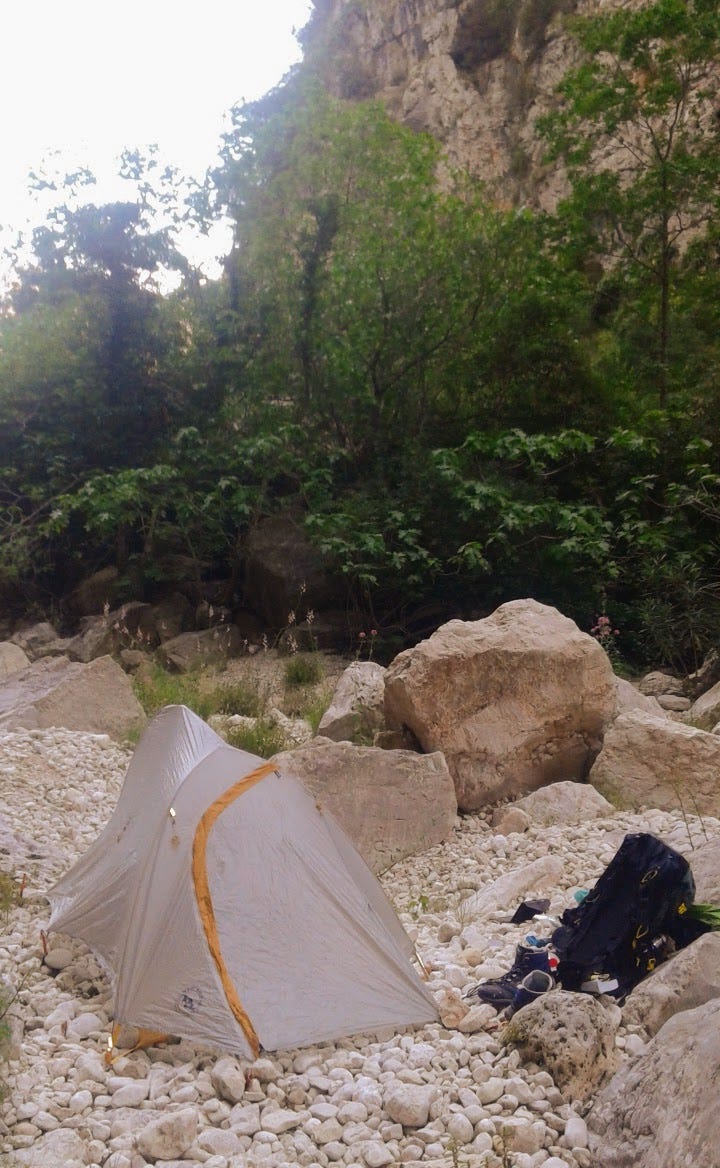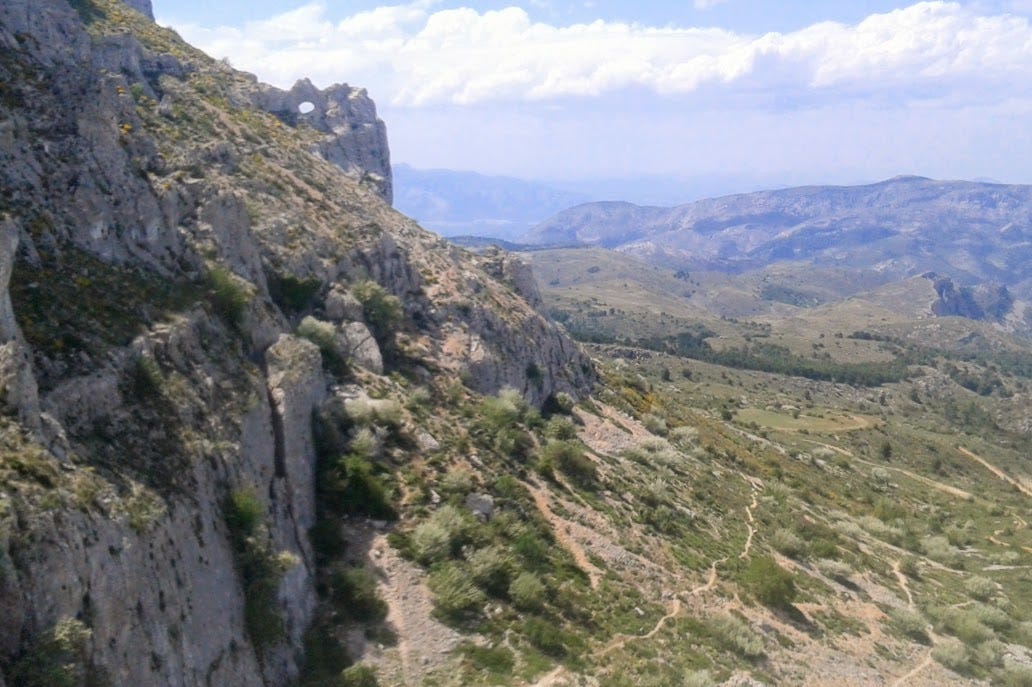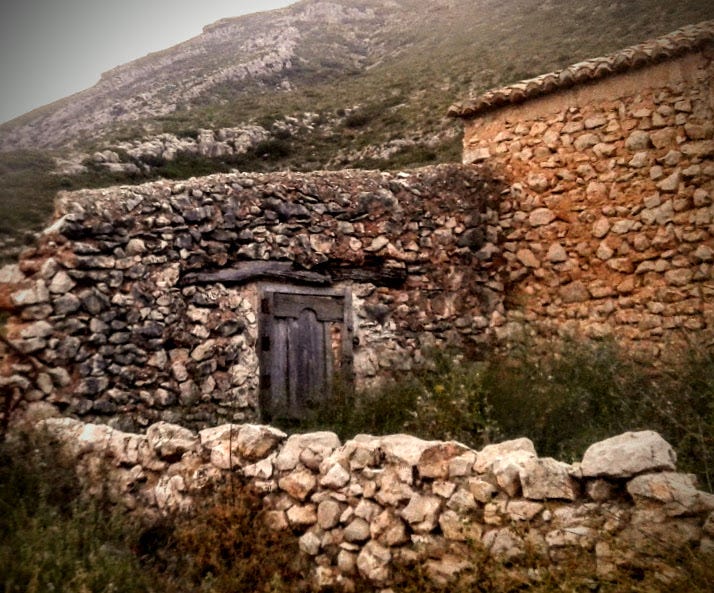Rightfully in the Wrong Place
Travel adventures in pursuit of the right to roam, and a look at access rights as a part of land reform
This is a story about being a stupid American abroad.
But it is also a story about an attempt to move through the world as a human meeting their basic needs without excessive regard for private property lines, and what that allowed. Take it as a chance to consider how even just a slight loosening of our restrictive, uptight notions of ownership could open up vistas we never thought we’d see.
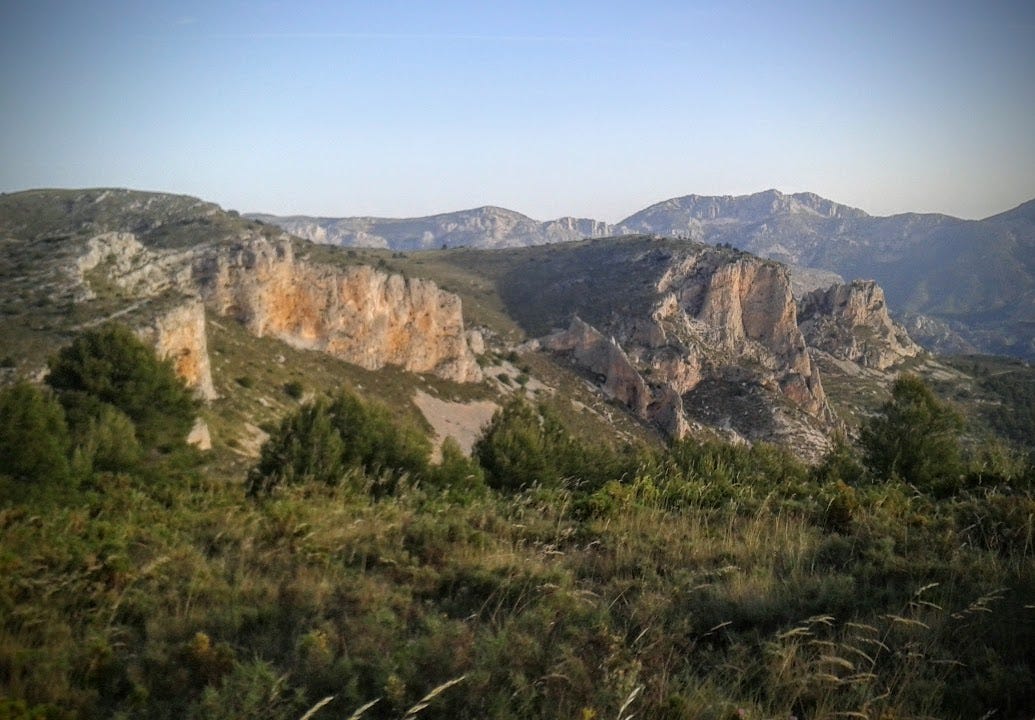
I was, once again, at the bottom of a ditch. This time it was intentional: I had made my way down here to rest. But as the hungry barks of trained dogs grew louder and louder, I fidgeted and grew more anxious.
Maybe they’re not coming for me, I reasoned. Maybe this was just standard country dog barking and my paranoia held responsibility for casting everything in a menacing tone. Maybe, but I was also fairly certain that the signs on nearby fences—which I’d only roughly understood, given my mediocre Spanish—stated something beyond simply “keep out.” Something maybe having to do with attack dogs.
Now technically, I wasn’t in one of those “keep out” fenced-in fields. There was a long gap in the wire where an empty creek bed passed under the road, and I had dropped down into the dry wash and walked up it a ways until I thought I was beyond the sight of cars. I had needed a rest; the sun still poured strong on everything around, despite the evening hour. Finding a bit of shade made by the creek bank’s steep side, I took a seat in the sandy gravel and leaned against my pack. I was just beginning to loosen the laces on my boots when the howls began.
Now technically… but I had a feeling attack dogs didn’t care much about technicalities.
I inspected the bank across from me; the fence, it turned out, was not complete here either. If the dogs found their way through all the busy rows of green up above, there was nothing to prevent them from coming straight down at me.
I pulled out my maps. My somewhat useless maps, when it came to telling me where I might pitch a tent. Few of the areas marked with a little triangle had turned out to be genuine campgrounds—I’d gone in search of one and had asked locals for help in finding it, all to no avail—so I was searching for other places to sleep. I’d stopped here in part because I knew I would soon hit the edge of a town. Town meant fewer places to sleep unnoticed, given the lack of campground. For other hikers on this route, the town would be a happy sight: they’d likely have pre-booked a room at some adorable little hotel, and by this time would be on both a second glass of wine and a second course of tapas. Or so suggested the British guidebook I’d picked up at a Barcelona shop selling English-language travel materials. While I had hoped, after a few months in Spain, to have Spanish at least sharp enough to understand travel instructions, I’d made neither heads nor tails of half the info in a guide to hiking the Pyrenees that I’d acquired. That’s how I’d landed myself here, struggling through the heat of the Costa Blanca mountains in southern Spain in late May. It’s a spot where the Brits love to vacation, though they generally have the sense to arrive a few months earlier when the weather is still mild. The British guidebook outlined a hiking route and towns at which to stop, and made a general mention that backpackers would also find places at which they could camp along the way. By this time, however, I had decided the book’s author knew nothing about backpacking and camping, and likely was reporting a bit of hearsay. I might trust their info on hotels, but if it was accurate, they were far outside my budget.
The howls increased in number and proximity. I finished off a bottle of water, and grimaced and scowled and made all other manner of annoyed faces as I put my pack back on, and scrambled back up to the asphalt.
As I trudged along, the barking continued, though its location grew less discernible and more dispersed among the many fields. The road curved around the small hill it hugged on its westward side, and I gained some relief as the shadow it cast provided the first real shade I’d had in hours of walking.
The lots grew smaller and turned from large cultivated fields to smaller farms and gardens surrounding old houses in various states of upkeep. Slowly the town came into view, a collection of stone buildings creeping up the next hillside. The maps came out again as I verified the turns I needed to make in order to cut through town and begin the climb up and over the rise. As I set foot on the cobbled streets I passed a pair of older women in long skirts who looked at me expectantly, their eyes lifted; I nodded and continued on and they looked away, returned to talking.
Town was small, and soon the street had turned to gravel and the path narrowed as it headed upward. Back here, the houses were truly falling apart, gates half-hinged and windows gone, scraps of machinery and fabric in the courtyards. I passed through the opening of a crumbling stone wall and felt like I’d entered a new world, stepping onto a dirt path that climbed up through overgrown weeds towards a high ridge that extended from the hill’s far side.
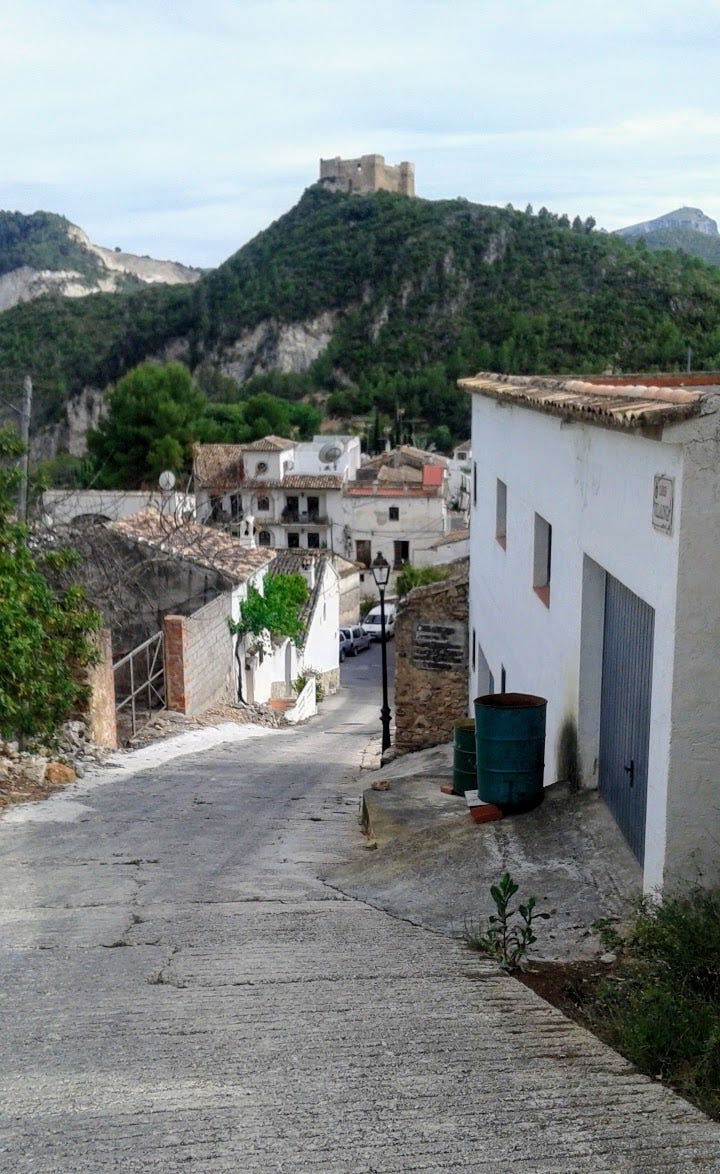
The shadows finally grew long as I walked slowly up, holding out hope that the ridge offered a solution to my dilemma of where I might sleep that night. When I reached it at last, the sun had set and the first drafts of evening breeze were coming in. My path continued up and around the hill before descending into the next valley, but the ridge extended the opposite way, turning into a point overlooking all the fields through which I’d just passed. I found small patches of ground in which to step around the prickly plants sprawling every which way, and after a few minutes, saw pieces of worn white stone shining up through the overgrowth. A few yards out, and an entire stone slab exposed itself. Just beyond that, I could see the broken base of another structure, the outline of a room, its walls now only a foot or two high and cracked. How old is this? Did someone really build a little house all the way up here, on this narrow ridge? I was in no danger of falling off, but there wasn’t extensive room for error. Not a good place to be a sleepwalker.
I slung off my pack and set it next to the wall of the long-ago room, and turned around to face the slab. Seems pretty flat. I lay down upon it, propped my head under my hands. The sky had darkened enough that a handful of stars now flickered above me. Far below, dog barks echoed through the valley, their impact evaporating long before reaching my ears. A fine place to sleep, I thought.
I took out the rainfly for my tent and draped it across the slab before pulling out my sleeping bag. I washed off with a bit of extra water and changed into my less dusty pair of clothes before settling in, then slowly fell asleep among the starlit ruins.
So initially, I hadn’t worried much about locating campgrounds on this trip. I’d thought their presence more of a bonus, or a back-up. Much of my motivation for this whole venture was predicated on the fact that I had heard Spain had a variation of what is known as “the right to roam” in its legal code. Not too many weeks before, I had visited friends in Norway, where the freedom to walk and camp on private property “out of sight of the house” is indeed a well-documented right, what is known as “allmannsretten,” or “everyman’s right.” Because of this right, one can travel long distances through the countryside in Norway on foot, without booking lodgings or locating campgrounds; you merely need to show reasonable respect in your conduct.
I had often seen Spain appended to lists of countries with this same freedom.1 My guidebook had also suggested this was the case. But as I sought out a place to camp night after night in the Valencian countryside, I could sense that my presence was not quite typical. There were the alleged but mostly non-existent campgrounds, for one, and then there were the curious, inquiring stares I received just about everywhere I went. As the week progressed, I began to feel nervous at the mere sight of other people anytime I stopped alongside the back country roads, even just to stop and rest. For most stretches, there were no other travelers I could consult. Only in a few places did I feel as though I was on a trail meant for hikers; in one such spot, the route went along a dry riverbed and then up over worn, old footpaths cut out on a steep cliff where terrace farming had been attempted and abandoned some long time ago. I camped in the riverbed itself, wedged in between boulders and hanging plants and watching swifts travel between the walls of rock, before ascending the cliff in the morning. It was there, far from roads of any sort, that I slept most soundly that whole trip.
The exception to my isolation came mid-week, when I met a dozen or so men out hiking together. They were members of a walking club, and carried extensive picnicking supplies and skins of wine. They invited me to join them, shaking their heads at my dried foodstuffs and insisting I take more bread and cheese.
After lunch we hiked up to a rocky pass. Save for the riverbed, this area registered as the closest to “wilderness” by American backpacking standards as anything I’d come through. This turned out to be even more true than I imagined; as hikers in the West know, military training grounds are often not far away—it can be a frightening event, the first time one really feels that, coming as it may with the boom attending a jet breaking the sound barrier. While I saw no jets, on a ridge in sight of the pass sat an installation, clearly military in nature but covered in every manner of satellite and antenna imaginable. I knew there were U.S. bases here in southern Spain, aimed at intercepting communications in Northern Africa, but it still startled me to see one up close. My surprise quickly turned to shame at the presumption of the U.S. military and its extensions around the globe. It seemed to complicate my own presence. Was I a mere traveler, out to befriend garrulous hiking Spaniards, or a representative of a harmful global power? What did it mean to be so far away from home, to feel so out of place, and yet to have a clear material manifestation of U.S. imperial ambitions—ostensibly on my own behalf, despite my own protests against such actions—so strikingly present? But the hiking club members shrugged it off, and one offered me his thick and firm hand to pull me up and over the last and trickiest of the boulders we had to climb. We stepped through a large keyhole shape in the rock. Passing through, I wondered—had I come to some strange Tolkienesque land, with bands of merry travelers, portals through the mountains, and towers of Mordor beyond? Yet just as quickly it all disappeared, for our routes diverged. They turned right on a path that circled back around the mountain, while I faced left and began the descent into the next valley.
Even these hikers had looked surprised when hearing that I slept in a tent each night, though they seemed to admire the audacity of it. “You’re a brave one!” They said. I never have been quite sure about the difference between bravery and stupidity, and my experience the next night would have me wondering again which word rightly characterized my efforts. I was, for once, aiming for an established shelter, a small lodge intended for hikers. But I found myself uncertain of the way while crossing what seemed an endless rocky slope in a bout of bad weather, rain then hail then rain again. I waved down two men I saw at a distance, who waited for me to reach them. If I understood them correctly, they were out hunting wild sheep, and they let me know I had missed a turn a little ways back. The day was already late as I retraced my steps, and the weather still quite awful, so I sought shelter in the first place that I came upon: an abandoned farmhouse, with one room a former barn. It was dry inside, though the roof had gently collapsed in different places. I stood inside a moment to warm myself before deciding against the overall stability of the roof. In the end I pitched my tent outdoors again, but inside the buildings little courtyard, which cut off the worst of the gusts.
That wind would make my final night, in which I at last camped in an official “campground”—mostly terraced strips of dry grass on the edge of a highway leading toward the coast—feel relatively peaceful, despite occasional headlights and echoes of radio. The next morning, I walked into town, the biggest I had seen in a week and full of weekend visitors lounging about and eating while waiting for some yearly flower-themed festival to begin. The bus from there took me through beachside resort cities and then back to Valencia, to the hostel where I had stayed several nights before embarking and had left some of my belongings. During that first stay—even then uncertain of the quality of my guidebook’s guidance—I had inquired with the host about the feasibility of my plan. Our conversation had been half in Spanish, half in English; we’d start in one and continue until we got stuck on something one of us didn’t understand, then switch over, then back again. I had left with both his well wishes but also his apologies that his co-proprietor, who really knew about hiking in the area, was not present and available to answer my questions.
Upon my return to the hostel, that second proprietor was on duty, and asked about my travels. As I explained where I had just been, and my various adventures, his eyes grew wide and he shook his head quite vigorously. “But this is not legal, what you have just done!” In hopes of somehow leading him to conclude otherwise, I showed him the guidebook; I told him about Norway; I told him how his co-host had seemed to approve of the plan. He broke down laughing. “No, no, I think you have been very mistaken. It is possible that this is true in other provinces, though I am not even sure of that; but here, no, definitely not.” He looked at my forlorn face and then bent over laughing again. “Ah, well, you made it back. Everything’s okay, no?”
My initial dismay at my unintentional law-breaking eventually shifted to a kind of cranky self-righteousness over the matter. Why shouldn’t I have done as I did? And why wasn’t the right to roam guaranteed everywhere?
Isn’t this a reasonable set of questions? Why should we go about ticketing or arresting someone who seeks shelter in a rainstorm? Or who, finding themselves too weary to go on, curls up in a creekbed for some rest? Yet our notions of private property have led us to criminalize these very natural, sensible behaviors.
It’s not that countries with a “right to roam” don’t also have laws regarding private property. The difference is that the focus in the United States (and now increasingly many other places) is on the right to exclude users, as opposed to a right simply to govern use. But in reality, there is no reason we can’t have forms of property ownership in which title and access are more loosely connected. In right-to-roam countries, the health and well-being of the entire population simply takes priority over the whims of one individual to feel complete control over whatever scenic bit of land they managed to acquire by plunking down a wad of cash. In these places, that others do not have the same access to capital does not prevent them from having access to outdoor spaces.
In fact, restrictions on the right to roam, and restrictions on the right to subsistence activities on the lands near which one lives, are historically fairly recent. When it comes to Europe, for instance (the timeline varies by country), the enclosures—the act of removing public or common land for the exclusive use of the wealthy aristocracy—took place from the 15th century on. The enclosures are often understood as an essential ingredient in the formation of capitalism; forced off the land, peasants would relocate to cities to join the urban class of laborers. That is, theft of land and more exclusionary notions of property were necessary to create a system where enough people would accept wage labor over communal and/or subsistence forms of survival.2
In the UK especially, there have been active fights to restore access rights, at least for walking, throughout the last century. While the success has been mixed, there were major wins in Scotland a couple decades ago. The right to access land for recreational purposes has been active since 2005 after the Land Reform Act of 2003.
The UK framing of access rights around recreational pursuits like walking mirrors that in the Nordic countries, where there is a strong cultural emphasis on outdoor recreation. Access rights, however, can be more expansive, such as pre-enclosure rights to harvest wood or plants or graze livestock. It’s such access or usage rights that are at stake for many fighting under the call to “honor the treaties.” Access is what was promised in many instances where land was officially ceded; often this was done with a presumption of shared use, as opposed to exclusionary, “don’t cross my fence line” property rights. But many nations have found themselves literally fenced out, unable to access ancestral sites and more. The Nez Perce recently purchased land they should have had access rights to but had been denied use of for years.
Despite its legal basis in treaties, access rights remain fairly outside the typical American viewpoint on land use. This is true even for the more mild “right to roam” version of access focused simply on passing through property. Yet it’s possible we’re at a moment where this could begin to change. Fights like the one against Line 3 are expanding awareness of treaty rights. And there is a growing body of outdoor enthusiasts that—benefitting from a century of organizing and negotiation with land-holders to create long-distance footpaths like the Appalachian Trail—certainly understand the benefit of more flexible notions of private property, and might serve as a base for someone who wished to organize a campaign for the right to roam. Thru-hikers on the AT and other long trails already find themselves figuring out how to “stealth camp,” as they call it, when stuck on their way to or from town while attempting to resupply. What’s more, a “right to roam” might go a long ways in addressing some of the current battles over where those without houses might find a place to reside. While the idea of “camping outside of view of the house” may need tweaking for our current context, even in its traditional form it provides a stark moral contrast to the public sleeping bans popping up around the country. (I wrote a related post, on the need for a right to sleep in public, back in March.) The strategy of a campaign for such rights across Turtle Island is certainly an open question, and I have yet to investigate to see if there have been any past attempts on the matter. But it seems clear that the winner-takes-all form of private property with which we currently operate, much like our winner-takes-all form of politics, is serving us less and less well, and the need for a new framework daily becoming more and more obvious.
Even with all my anxiousness about it, on my trip to Spain, I opted to believe in my right to be, and to fill one of our most basic needs—to sleep!—without paying to do so. It was eye-opening to see how insecure I felt that entire week, and yet I pushed myself to continue on nonetheless, and visited places I would never have been able to see otherwise. Yet the stakes were much lower for me than they are for those who must cross national borders after climate disasters, or those seeking to sleep in their old neighborhood after an eviction. And it came with none of the weight of long-standing relationships to the land through which I traveled, as is the case for Native folks denied access rights for gathering, ceremony, and other uses. But establishing a right to roam could provide a solid footing on which to press for the additional access rights and broader freedom of movement needed in all these cases. By even raising the possibility of separating access and ownership, a right to roam just might help us take some first steps on a longer journey toward new forms of property focused on the common good.
For instance, in a discussion of battles over access rights for walking in England in Wanderlust: A History of Walking, Rebecca Solnit says that “British rights-of-way are not impressive compared to those of other European countries—Denmark, Holland, Sweden, Spain—where citizens retain much wider rights of access to open space.” While Solnit is a much more thorough citer of sources than most essayists, she unfortunately gives no citation for this list on which one can follow up.
Popular titles on this subject included Peter Linebaugh’s Stop Thief! The Commons, Enclosures, and Resistance, and Sylvia Federici’s Caliban and the Witch: Women, the Body, and Primitive Accumulation.


